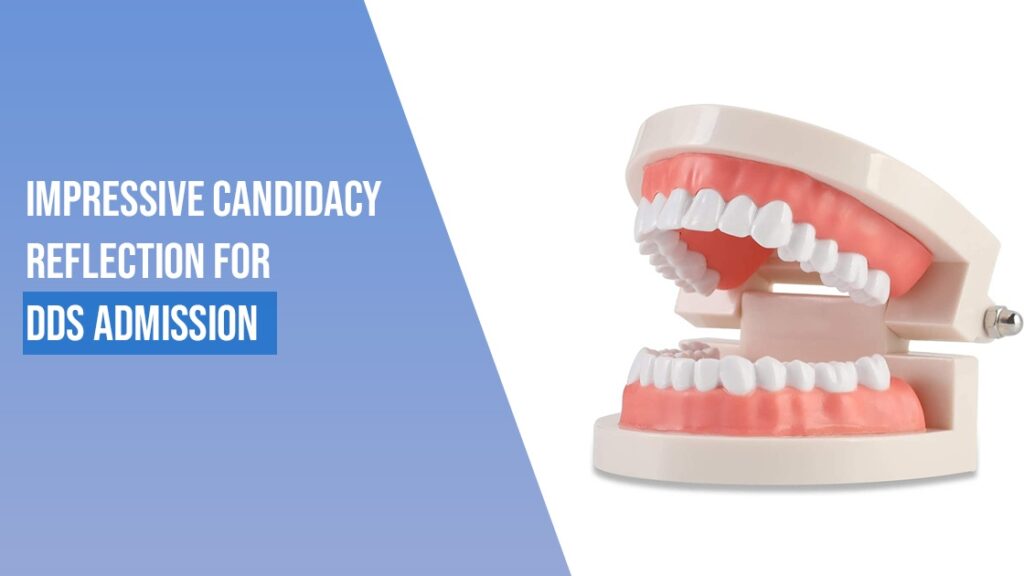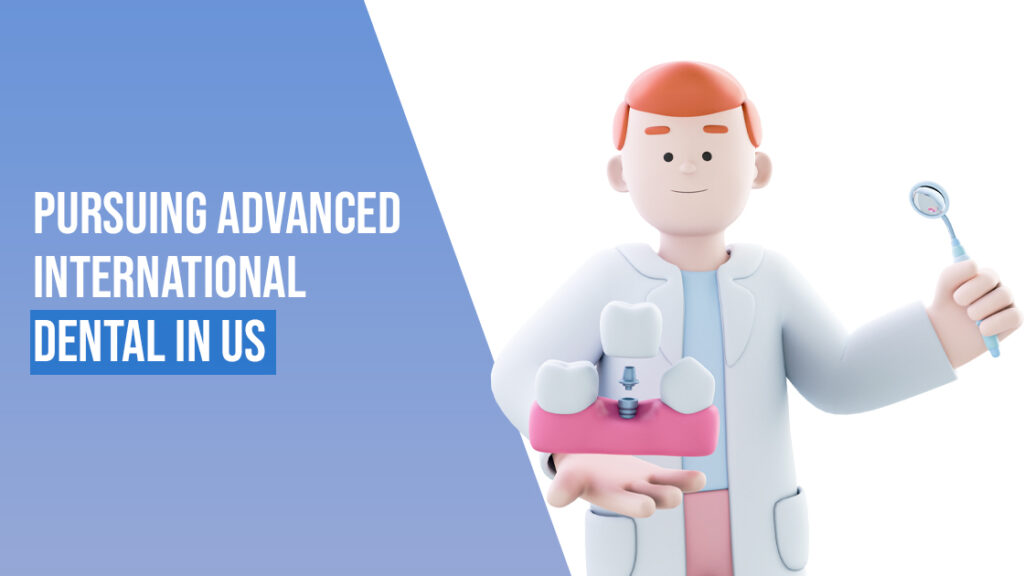FAQ’s
Let’s get through some FAQs before we dive deep into DSOs. We’ve written this article keeping in mind International Dentists and their needs –
Will DSOs sponsor Visas like H1B?
Yes, H-1B visas are typically sponsored by U.S. employers who want to hire foreign nationals for specialized, non-immigrant work positions in the United States.
Can I apply to a DSO while pursuing the Advanced Standing Program?
Yes, DSOs do on-campus lunch and learns, informational sessions, and hiring events while schooling.
How will an International Dentist get paid if they join a DSO?
Dentists at DSOs are paid over a broad spectrum, including salary, production-based compensation, bonuses, incentives, benefits, and profit sharing.
Can I work for a DSO without completing a DDS International Dental Program?
Working for a DSO as a dentist typically requires a dental degree and the necessary licensure to practice dentistry in the region where the DSO operates.
Are DSOs a risky career option if I want to own a dental practice?
Whether working for a DSO is risky depends on how it aligns with your career goals and preferences. If your ultimate goal is to own your dental practice, starting and managing your practice may be the path you want to pursue. This comes with its own challenges and financial risks, including the need to handle administrative tasks, marketing, and practice management.
How can international dentists appeal to DSO recruiters? How do I find them?
Build a professional network within the dental community, attend dental conferences, and engage with dental associations in your area. Networking can help you learn about job opportunities and get referrals.
Let’s dive deeper in our understanding of DSO’s:
Dental corporations, or dental service organizations (DSOs), provide business and administrative support services to dental practices. These organizations are designed to streamline and enhance the operational aspects of dental practices, allowing dentists to focus more on patient care. Dental corporates can range from small regional organizations to large national or international chains. In the US, there are primarily two types of dental service organizations (DSOs):
- DSOs funded by private equity (backed by investors or private equity firms fund) frequently have extensive financial resources, enabling them to invest in infrastructure, marketing, and technology to support their expansion. Usually, their goal is to expand and combine many dental clinics under one roof quickly.
- DSOs that are independent or doctor-owned are those that were founded and are run by dentists. They might work together to establish a network of associated dental practices. Maintaining clinical autonomy and encouraging collaboration among dentists are priorities for doctor-owned DSOs.
Both DSOs can offer similar benefits and challenges, but their underlying structures and motivations may differ. It’s essential for dentists considering joining a DSO to thoroughly research the specific organization, understand its mission, values, and approach to patient care, and assess how well it aligns with their own professional goals and values. You can use websites like LinkedIn, Glassdoor, and Indeed to inspect the spine of the organization.
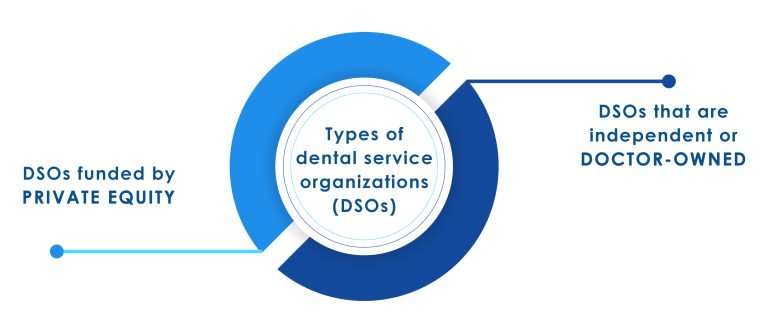
You’ll have the following as your options:
- Heartland Dental
- Aspen Dental Management, Inc.
- Pacific Dental Services (PDS)
- Affordable Dentures & Implants
- Smile Brands Inc.
- Benevis (Kool Smiles)
- Great Expressions Dental Centers
- Mortenson Dental Partners
- Western Dental & Orthodontics
- Midwest Dental
- Sage Dental
- Coast Dental & Orthodontics
- DentalOne Partners
- North American Dental Group (NADG)
- ForwardDental
- Familia Dental
- Dental dreams, and adding more..
It’s not a bad idea to conduct thorough research, seek feedback from current or past affiliated dentists, and understand the contractual terms and support structure if you consider joining a dental corporation to make an informed decision.
It offers both benefits and drawbacks, and you can peep in.
Benefits:
- Professional growth: DSOs frequently provide chances for continuing education and training, which can assist dentists in honing their abilities and staying current with the most recent developments in dentistry.
- Shared administrative burden: By handling administrative duties like billing, marketing, and human resources, DSOs free dentists to concentrate more on patient care.
- Access to resources: DSOs may offer access to cutting-edge tools and technologies that independent dentistry clinics may find expensive to acquire.
- Economies of scale: DSOs can use their size and resources to their advantage to bargain for better prices on supplies, lowering costs for connected dentists.
- Potential for mobility: DSOs can present prospects for employment in several locations or specialization in various disciplines for dentists wishing to grow their practice or obtain more experience.
- Application while in the school: DSOs do campus recruitment early in the senior year of the school. It’s never a bad idea to shortlist the location for permanent settlement, set realistic future goals right from the beginning, and interview for a few DSOs.
- Accepts Residency students: A few states allow dentists to practice without a DDS/DMD with residency degrees. DSOs welcome specialized employees to be recruited for practice and CDE mentorship.
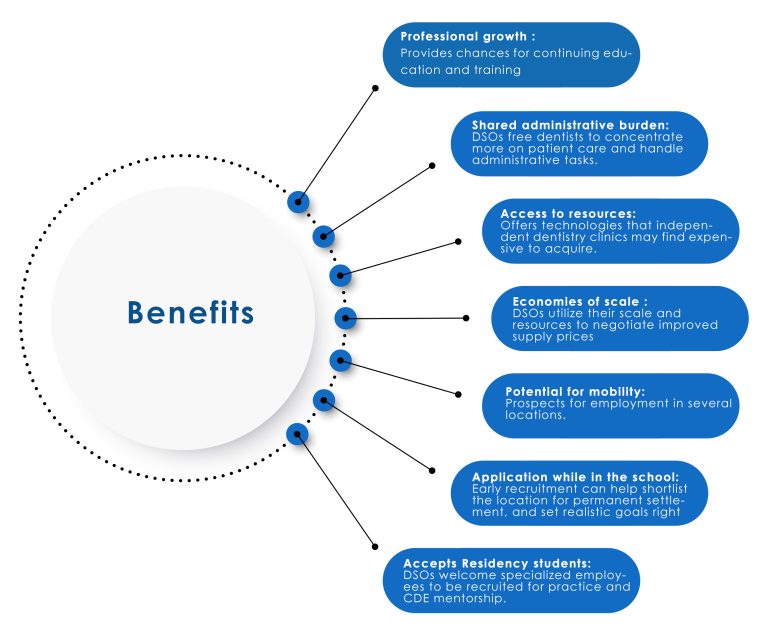
Drawbacks:
- Profit-sharing: While DSOs assist, they also receive a cut of the business’s earnings, which could affect the dentist’s earnings compared to operating an independent practice.
- Corporate Pressure: Some dentists might experience pressure from the DSO to accomplish specific productivity or revenue targets, which could impact their patient care choices.
- Limited Local Branding: Because the practice is frequently linked to the larger DSO’s brand, dentists in a DSO may have less freedom to create their own unique brand.
- Loss of Autonomy: Due to the obligation to follow the DSO’s procedures and guidelines, dentists who work in DSOs could have less autonomy over their clinical decisions and treatment plans.
- Exit Restrictions: Signing contracts with noncompete restrictions may prevent them from starting their independent practice nearby or quitting.
- DSO Quality Variability: Since no two DSOs are the same, there can be substantial differences in the resources and support various organizations offer.
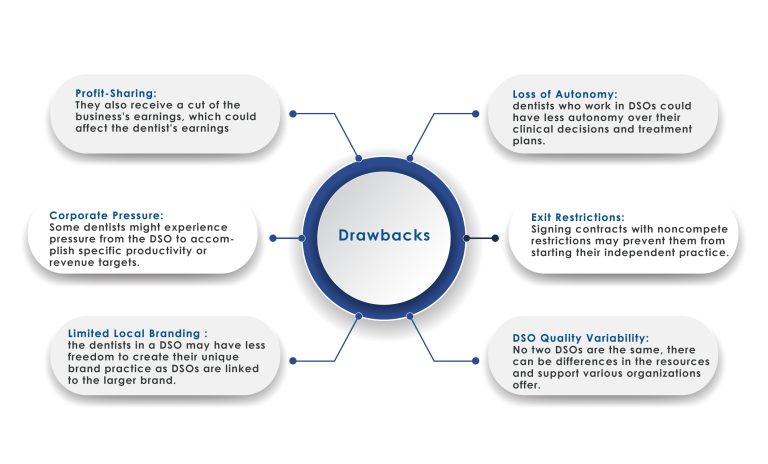
DSOs for International Dentists
They can sponsor certain types of work visas for foreign dentists. However, the sponsorship process can be complex and subject to various legal requirements set by the U.S. Citizenship and Immigration Services (USCIS). Here are some key points to consider regarding visa sponsorship via dental DSOs:
- Eligibility: The specific visa types available for sponsorship depend on the dentist’s qualifications, work experience, and the needs of the dental corporation. Dental DSOs may consider sponsoring common work visas, including H-1B visas for specialized workers and J-1 visas for exchange visitors such as foreign dentists.
- Job Offer: To be sponsored for a work visa, the dentist typically needs a job offer from the dental corporation or an affiliated dental practice. The proposal should be for a position that requires the dentist’s specific skills and qualifications.
- Visa Process: The visa sponsorship process involves several steps, including filing a petition with USCIS on behalf of the foreign dentist. The dental DSO must demonstrate that there is a genuine job offer and that the dentist meets the qualifications for the specific visa category. The legal team deals with myriad visa processes, hence making it easier for any international dentists to be secured.
- Legal Assistance: Navigating the visa sponsorship process can be complex, and it is highly recommended for both the dental corporation and the dentist to seek legal assistance from an experienced immigration attorney specializing in work visas.
- Work Authorization: Once the visa application is approved, the dentist will be granted work authorization for the specific position and employer mentioned in the visa approval notice.
- Visa Duration: The work visa duration will depend on the specific visa type and other factors. Some visas may be granted for a particular period, while others may be extendable or lead to permanent residency (green card) options.
Dental corporations and foreign dentists should thoroughly understand the legal requirements and obligations of visa sponsorship before proceeding. Seeking professional advice from an immigration attorney is crucial to ensure a smooth and compliant visa sponsorship experience.
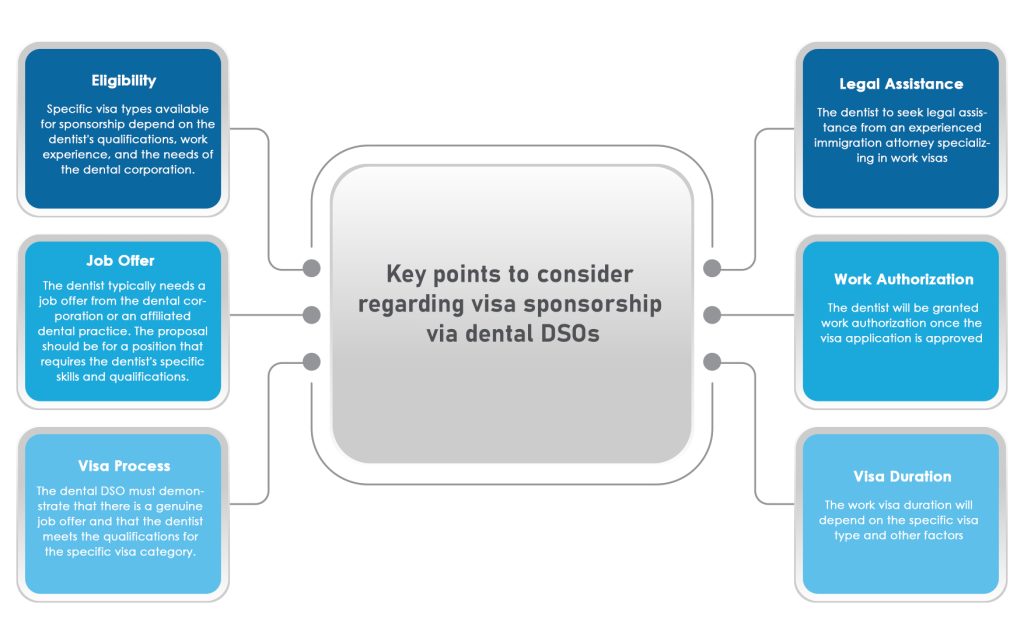
Approaching DSO’s Recruiting Team
- Research DSOs: Research different Dental Service Organizations to identify the ones that align with your career goals, values, and location preferences. Look for information about their size, locations, services, and company culture.
- Update Your Resume and LinkedIn Profile: Ensure your resume and LinkedIn profile are up-to-date, highlighting your relevant skills, education, and experience in the dental industry. Use keywords related to dentistry to increase your visibility to recruiters.
- Online Job Boards: Search for dental job openings on Indeed, LinkedIn, Glassdoor, and specialized dental job websites. Many DSOs post their job listings on these platforms.
- Network: Connect with professionals in the dental industry on LinkedIn. Attend dental conferences, seminars, and workshops to expand your network. Many DSOs also have LinkedIn pages where they post job openings, so follow those pages to stay informed.
- Company Websites: Visit the websites of the DSOs you are interested in. They often have a dedicated careers section where you can find job listings and information about their recruitment process.
- Follow-Up: After submitting your application, consider sending a polite follow-up email to the recruiter or HR department to express your continued interest in the position. This can help you stand out and show your enthusiasm.
- Be Open to Temporary or Contract Roles: Some DSOs may offer temporary or contract positions initially. These can be a foot in the door and lead to permanent positions.
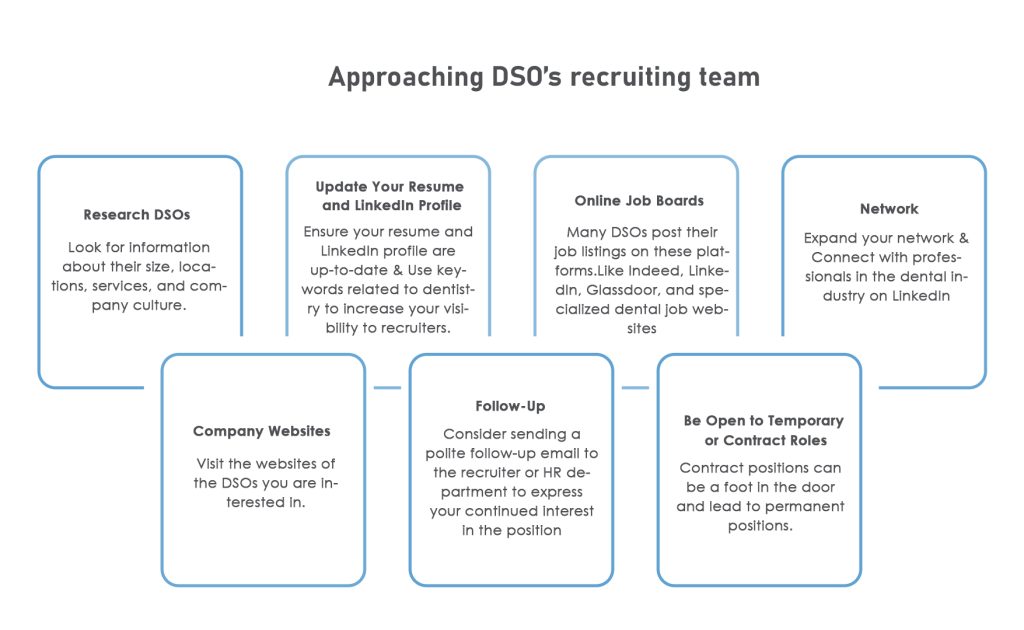
Reading DSOs Contracts
Remember that contracts are legally binding agreements, and it’s crucial to fully understand their implications before signing. Here are a few tips:
- Take your time: A contract is a legally binding, so don’t rush through it. Read and understand each clause carefully. Ask for legal advice from a qualified attorney if you are uncertain about specific terms or legal terminology in the contract.
- Understand the purpose of the contract:
- What is the primary purpose of the agreement?
- What is each party expected to receive or gain from the deal?
- Understand your obligations: What are your responsibilities and the dental corporation’s obligations?
- Key Elements: Consider elements like Compensation models, noncompete clauses, term and termination, clinical autonomy, patient data ownership, dispute resolution procedures, and other critical words specific to your dental practice
- Payment terms: Monitor the terms and conditions of the payment agreement, including how much you will be paid and when, as well as any deductions or fees that may be applicable.
- Noncompete clauses: Monitor the provisions, as they may limit your ability to practice in the same region or provide similar services. Termination clause: Review the terms and conditions for termination of the agreement if you wish to end your affiliation.
- Patient confidentiality and data protection: Review the patient confidentiality and data protection clauses to ensure you comply with applicable laws and regulations;
- Indemnity and liability: Review the indemnity and liability clauses to ensure you understand your potential liability in case of a dispute or legal action.
- Changes and addendums: Review the contract terms to determine if any changes can be made.
- Document any promises: If there are verbal promises during the negotiations, ensure they are reflected in the written agreement.
Compensation Model of Dental Corporates
Dental corporations offer more patients with a target-based goal and have different compensation models for their affiliated dentists. The base salary offered is competitive with the average salary in the market, but it has additional benefits. Here are some of the most common compensation models used by dental corporations.
- Salaried Dentists are paid a fixed salary for the services they provide. This model offers stability and predictable income but may give less earning potential than other models.
- Production-based compensation is paid for the amount of production dentists produce. The more dentistry performed, the higher the salary. This model rewards productivity.
- Collections-based Dentists receive collections-based compensation for the services they perform. The compensation is linked to the practice’s revenue from patients or insurance companies.
- Percentage of production: Dentists earn a percentage of their service revenue. This model gives dentists a share in the practice’s financial success and incentivizes them to perform to the best of their ability.
- Hybrid models: Some dental corporations combine elements of several different compensation models to create a hybrid model that best suits the dentist’s and the organization’s needs.
- Bonuses/Incentives: Dentists may be eligible for bonuses or other incentives based on specific performance metrics (e.g., patient retention rate, patient satisfaction score, or meeting production targets).
Career Risk with DSOs
Whether working for a DSO is risky if you eventually want to own a dental practice depends on your specific goals and circumstances. Here are some factors to consider:
- Gain Experience: Working for a DSO can provide valuable experience in dental practice management. It can help you develop your clinical skills and understand the operational aspects of running a dental practice.
- Ownership Goals: If your long-term goal is to own a dental practice, working for a DSO can be a strategic step. Many dentists gain experience and save money while working for a DSO before starting their practices.
- Financial Stability: DSOs may offer a steady income and benefits, which can be attractive, especially for new graduates with student loan debt. This financial stability can help you save money for future practice.
- Limited Autonomy: While working for a DSO, you may have limited control over clinical autonomy compared to owning your practice. Some dentists prefer the freedom and control that comes with ownership.
- Non-Compete Agreements: Some DSOs may have non-compete agreements restricting your ability to open a practice in a particular area (specific miles away) or for a certain period after leaving the DSO. It’s essential to understand the terms of your employment contract.
- Business Skills: Owning a dental practice requires clinical skills and business acumen. Working for a DSO can help you develop these skills by observing how they manage operations and finances.
Corporates vs. FQHCs (Federally Qualified Healthcare Centers)
“Federal dental care” describes dental services and programs offered or funded by the US government.
- Patient base:
Corporates: They typically serve a broad patient base and may manage multiple dental practices.
FQHCs: These programs may be connected to more extensive government healthcare programs and often focus on specific populations. For example, federal dental care programs attract veterans through the VA dental care program or low-income citizens through Medicaid.
- Coverage and Services:
Corporates: They may offer a range of services, but the scope of coverage may vary depending on the specific corporation and the types of insurance plans they accept. Since the primary goal of the organization is to maximize shareholder value, they will narrow their service portfolio or standardize protocol across all their dentists to maximize profits.
FQHCs usually provide a specific set of services, and the coverage may be more limited compared to private dental insurance plans.
Your choice of where you wish to work is personal, and if you want to learn more about the alternative, skip over to the next blog on FQHCs.

